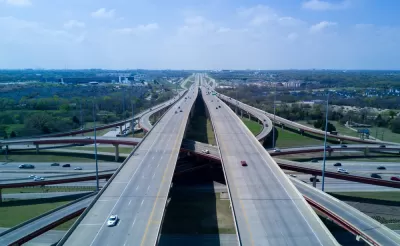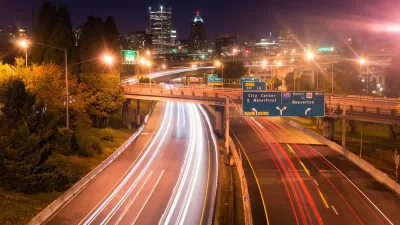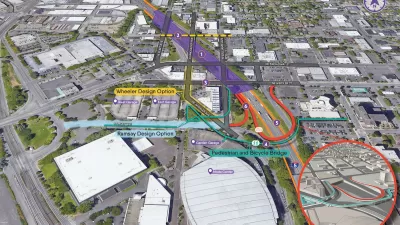Far from kickstarting a transformative change in transportation policy, the 2021 bipartisan infrastructure law continues to fund traditional road-building projects.

Despite President Biden’s assertion that the 2021 bipartisan infrastructure law was “a historic spending measure that would not only improve the nation’s dilapidated roads and bridges, but also address climate change and help communities recover from past transportation policies that segregated people of color,” funding from the bill is in fact largely “fueling a rush of highway projects like Houston’s expansion of Interstate 45 that could undercut the administration’s environmental goals, said Beth Osborne, a former acting assistant secretary for transportation policy at the Department of Transportation.”
This according to an article by Mike Lee in Climate Wire, which asserts that without changes to “long-standing funding formulas that historically have fueled state efforts to pave more lanes,” the law will continue to fund traditional road expansion projects.
As one example, Lee outlines the contentious history of the North Houston Highway Improvement project, an expansion of Interstate 45 which the Texas Department of Transportation (TxDOT) is attempting to push forward with despite years of opposition from local leaders, including the city’s mayor, and community groups. After ordering the agency to stop work on the project while the Federal Highway Administration (FHWA) investigated a civil rights complaint, “In March, FHWA said it had resolved its civil rights investigation and reached a settlement with Texas officials that would allow the project to be built.”
FULL STORY: A transportation ‘revolution’? How the infrastructure law is fueling freeways.

Maui's Vacation Rental Debate Turns Ugly
Verbal attacks, misinformation campaigns and fistfights plague a high-stakes debate to convert thousands of vacation rentals into long-term housing.

Planetizen Federal Action Tracker
A weekly monitor of how Trump’s orders and actions are impacting planners and planning in America.

In Urban Planning, AI Prompting Could be the New Design Thinking
Creativity has long been key to great urban design. What if we see AI as our new creative partner?

King County Supportive Housing Program Offers Hope for Unhoused Residents
The county is taking a ‘Housing First’ approach that prioritizes getting people into housing, then offering wraparound supportive services.

Researchers Use AI to Get Clearer Picture of US Housing
Analysts are using artificial intelligence to supercharge their research by allowing them to comb through data faster. Though these AI tools can be error prone, they save time and housing researchers are optimistic about the future.

Making Shared Micromobility More Inclusive
Cities and shared mobility system operators can do more to include people with disabilities in planning and operations, per a new report.
Urban Design for Planners 1: Software Tools
This six-course series explores essential urban design concepts using open source software and equips planners with the tools they need to participate fully in the urban design process.
Planning for Universal Design
Learn the tools for implementing Universal Design in planning regulations.
planning NEXT
Appalachian Highlands Housing Partners
Mpact (founded as Rail~Volution)
City of Camden Redevelopment Agency
City of Astoria
City of Portland
City of Laramie





























